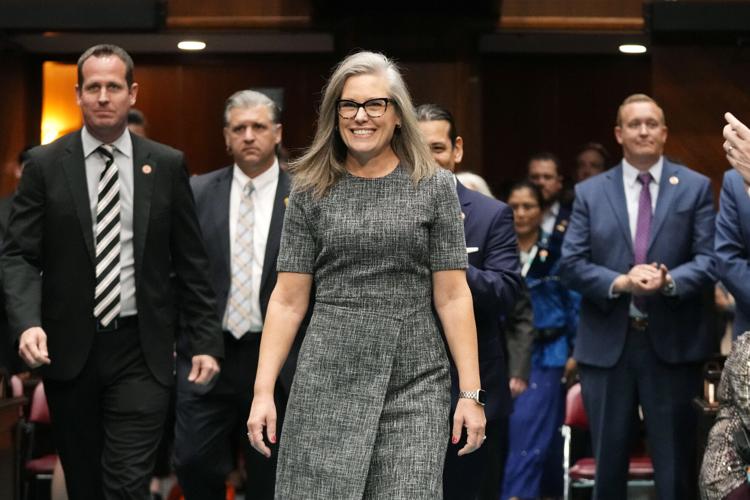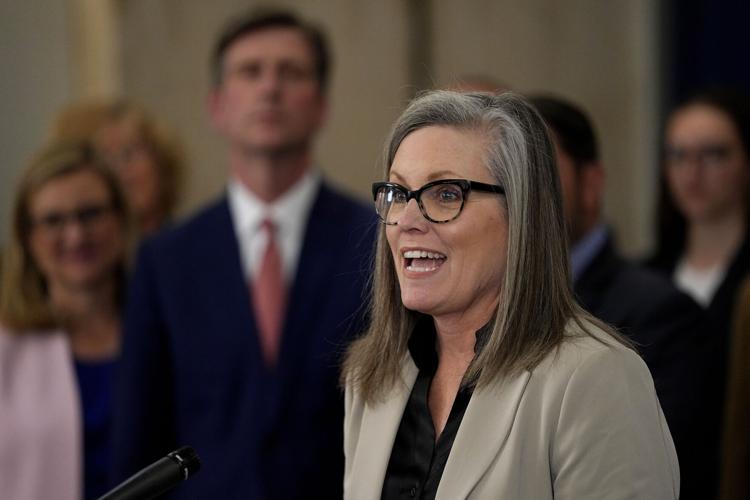PHOENIX — Democrat Katie Hobbs completes her first 100 days as governor Wednesday, a time marked by controversies, executive orders and the liberal use of her veto stamp.
We’ve seen this movie before, two decades earlier, when Janet Napolitano — the only other Democratic Arizona governor this century — took office after an election win, over Republican Matt Salmon, even narrower than Hobbs’ victory over Republican Kari Lake.
The political situation today is “eerily similar,” said Prescott Republican Ken Bennett, who was Arizona Senate president in 2003 and is back at the Capitol now.
Napolitano herself told Capitol Media Services she sees the parallels — though she thinks Hobbs has it much harder than she did.
Moving up from another statewide office?
Check. Hobbs was secretary of state. Napolitano had been attorney general.
Inheriting a Republican-controlled Legislature?
Ditto. The GOP, then and now, has a majority.
Getting criticized for issuing executive orders rather than working with lawmakers?
Yup. Hobbs has signed 10 so far, along with halting executions while a task force studies the issue. Napolitano was blasted for some orders, including one creating a program for affordable prescriptions.
Early controversies?
For Napolitano it was a heavy-handed way of trying to get Phoenix’s Squaw Peak renamed, with an aide pressuring the commission that makes such decisions. For Hobbs, it took her weeks to disclose the source, and planned political use, of $2.5 million supposedly raised to cover her inaugural expenses, which one aide frankly called a “self-inflicted wound.”
And then there’s the frequent use of the veto power.
Hobbs already surpassed Napolitano’s number of vetoes for her first year in office. As of Tuesday she hit 43; Napolitano had just 17 for the whole legislative session.
The new governor is rapidly closing in on Napolitano’s all-time record of 58 vetoes, set in 2005.
Playing defense against ‘veto bait’
Hobbs acknowledged that, for the moment, she has had to play defense, swatting down GOP measures, versus advancing her own legislative agenda.
“That shouldn’t surprise anyone,” Hobbs told Capitol Media Services. “I talked about this during the election that this is sanity versus chaos.”
Hobbs said she is willing to work with anyone to deal with tough challenges.
“I’m not here to veto more bills than anyone else,” she said. “But I’m not going to entertain legislation that doesn’t tackle those challenges, that moves backwards on people’s rights versus forward. I don’t think there should be too many surprises in the things I have sent back.”
She said she assumes that some Republicans, rather than waste political capital trying to kill a poorly crafted measure, simply agree to send it to her “because they know it’s going to get vetoed.”
Napolitano said she saw her share of those.
“Oftentimes, they’d send me bills they knew full well I was going to veto,” she said. “We called them ‘veto bait.’”
But there was an upside, the former governor said.
“The bills actually gave me an opportunity to explain myself even better to the voting public,” Napolitano said. She said she believes those veto messages were part of the reason her 2006 reelection “was not a close race,” as she trounced Republican Len Munsil by a margin of close to 2-1.
Both Democratic governors used their veto powers on social issues.
Hobbs, for example, rejected a measure to dictate to doctors what care they must provide to newborns even if there is no chance of survival. And a bill increasing the penalty for domestic violence offenders if the victim was pregnant also fell, amid concerns it was a way of providing legal status to a fetus.
Napolitano, for her part, killed legislation that would have expanded the exemptions given to the Catholic Church from laws requiring employers to provide contraceptive coverage to workers.
‘I’m someone willing to take action’
Hobbs, like Napolitano, also defends her use of executive orders.
One that particularly aroused the ire of Sen. Jake Hoffman, R-Queen Creek, expanded anti-discrimination protections for state employees and contractors.
“The people of Arizona did not elect Katie Hobbs to rule by executive fiat,” he said. Hoffman, head of the Arizona Freedom Caucus, a group of conservative Republicans, said the role of the governor is solely to implement the laws approved by the House and Senate, not to unilaterally enact her “radical woke agenda.” He even threatened to sue, though that didn’t happen.
Hobbs countered that executive orders sometimes become necessary when lawmakers refuse to act. And she said there’s a public relations benefit, showing “I’m someone willing to take action.”
But while Hobbs wields her veto stamp and gets to issue executive orders, there’s only so much she can do, absent legislative cooperation, to advance her agenda.
For example, Hobbs wants to eliminate state sales taxes on diapers and feminine hygiene products. She also proposed a child tax credit for families earning less than $40,000 a year.
Instead, GOP lawmakers sent her bills to eliminate the ability of local governments to tax residential rentals and groceries, both of which she vetoed.
But her ability to get at least some of what she wants could hang on the crucial differences between 2003 and 2023. This Republican-controlled Legislature is markedly different than the one Napolitano inherited.
Lack of moderate Republicans cited
The 2003 legislative session had something in short supply this year — moderate Republicans, said Barrett Marson, then a politics reporter for the Arizona Daily Star and now a political consultant.
Senate GOP leaders seeking to advance their own agenda in Napolitano’s time had to gain the cooperation of moderates like Carolyn Allen and Slade Mead to have a working majority. The House Republican caucus featured moderates like Deb Gullett, Phil Hanson and Bill Konopnicki, whose politics were sometimes more closely aligned with Napolitano than with their GOP colleagues.
“There were certainly a number who were far right,’’ Napolitano explained of the 2003 Legislature. “But there were also several in both houses who you would work with and talk with and get you to the votes that you needed.’’
And what of moderate Republicans today?
“I think that it’s an oxymoron,’’ Hobbs said.
So instead, the governor said she seeks out GOP lawmakers on an individual basis with whom she can find common ground.
“Rep. (David) Cook is very focused on transportation issues and Prop. 400,’’ she said, the latter being a plan to extend Maricopa County’s half-cent sales tax for road and mass transit issues for another 20 years. Cook, a Globe Republican, occasionally refuses to provide the necessary 31st House vote for something the rest in his party want.
Hobbs said Bennett, a former secretary of state like her, is focused on election issues. “I’m not saying we agree on things,’’ she said. But she said Bennett understands the issues, which is why she tapped him to be on her bipartisan election task force.
Nominees sailed through in the past
There’s something else that’s different than 20 years ago: the ability of the governor to appoint a team of her choosing.
“Gov. Hobbs seems to have run into a little different issue with appointments and nominations than we afforded Napolitano for some reason,’’ said Bennett, noting that approvals of nominees were pretty much automatic. “I don’t remember that being much of an issue at all back then.’’
But this year, Senate President Warren Petersen, R-Gilbert, who declined to be interviewed for this story, created a special panel to review Hobbs’ nominations, and named Hoffman to chair it.
Hoffman’s panel already rejected Hobbs’ pick for state health chief, which he said is justified because he believes department heads can actually make policy. He also said the new governor is not doing a very good job of vetting her picks.
Hobbs, in turn, has clapped back, saying the Hoffman-led panel is not interested in seriously considering her picks.
“They’re interested in carrying out their personal vendetta against me and using my nominees as proxy to do that,’’ she said.
And the relationship between the new governor and at least some Republican legislators has been at times outright hostile, to the point of Sens. Justine Wadsack of Tucson and Anthony Kern of Glendale standing up and turning their backs to Hobbs during her State of the State speech while others walked out, unprecedented acts in recent history.
“The political dialogue overall is a little more polarized than maybe what we had with Napolitano,’’ Bennett said.
Budget has a surplus now
Napolitano had something else that Hobbs does not: a budget deficit.
She took office with the state having to cut more than $100 million for the current fiscal year and some estimates predicting the shortfall for the following year could approach $1 billion. And that’s in the days when the entire state budget was $6 billion versus more than $17 billion now.
That, recalled Bennett, “forced us to work together sooner rather than later.”
“He’s right,’’ Napolitano said. “We had to get at it right after the inaugural. We got that resolved and then settled into kind of a regular battle rhythm of how we get at things during the session.”
By contrast, Hobbs comes into office with a potential $1.7 billion surplus And both she and the GOP majority have ideas, often conflicting, about how to deal with that.
Aside from proposing the low-income child tax credit and the sales tax exemption for diapers and feminine hygiene products, Hobbs wants to expand basic state aid to education. But she would fund at least part of that through a proposal to repeal last year’s newly enacted universal school voucher program.
“That’s pretty hysterical,’’ said Senate President Pro Tem T.J. Shope of Coolidge. Legislative leaders declared Hobbs’ plan dead on arrival.
As it turns out, the voucher expansion will cost more than anticipated, eating into the surplus. And GOP lawmakers are advancing measures to cut taxes, either permanently or through a one-time rebate.
Changes in governor’s team
Hobbs also recently shook up her administration, firing her communications chief and replacing her with someone with national experience. She also created a new position of deputy chief of staff and several other people had their titles changed.
The governor said she thinks some people looking at the reasons for the changes are outsiders doing “Monday morning quarterbacking,” such as pointing to handling of the inaugural fund.
“But I think it’s also important for anyone in a leadership position to look at where they need to course-correct and taking that kind of action quickly,” Hobbs said. “I think we’ve done that so that we’re moving past anything that might take us in the wrong direction.”
Chuck Coughlin, a Republican political consultant in 2003 and now, said the move is “not surprising.”
“It takes time to develop the chemistry within an organization to be able to respond and to reflect the governor’s views through a very diffused governor’s office,’’ said Coughlin, who previously worked for Republican Gov. Fife Symington.
“My impression is nobody knows how to speak for her,’’ Coughlin said. “Everybody sort of genuflecting towards everybody else and trying to be very respectful … because they don’t want to get out of line. And it takes time for any organization, absent some domineering Type A personality that ends up leaving after a year, it takes time for that to gel.’’





